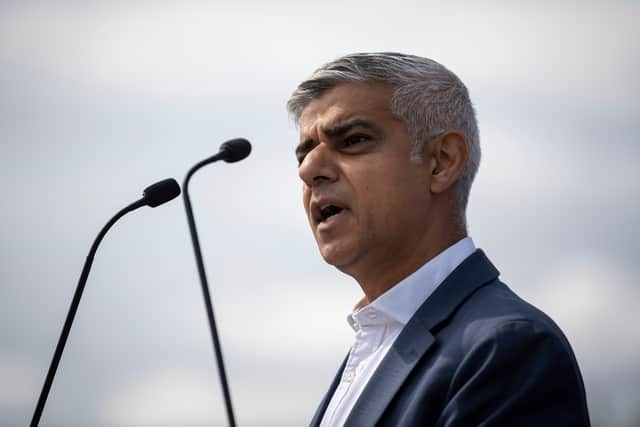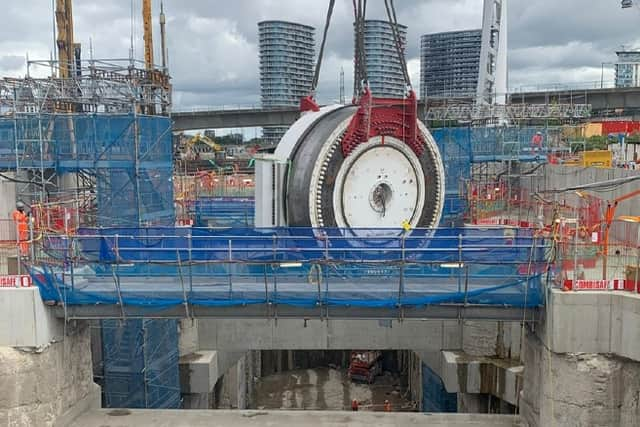Silvertown Tunnel: East London project must be halted to meet carbon budgets - researchers
This article contains affiliate links. We may earn a small commission on items purchased through this article, but that does not affect our editorial judgement.
and live on Freeview channel 276
The Silvertown Tunnel project should be halted if London is to meet key carbon budgets, a research paper has recommended, as campaigners claim the analysis blows any arguments for the scheme “out of the water”.
The scrapping of the project, which is due to connect Silvertown in Newham to the Greenwich peninsula via a tunnel beneath the Thames, is among a list of policies suggested to reduce private vehicle use in the capital.
Advertisement
Hide AdAdvertisement
Hide AdOne of Sadiq Khan’s most controversial initiatives, the mayor champions the tunnel’s construction as a means of reducing congestion and improving public transport. However, campaigners have argued it will instead result in 30,000 new vehicle journeys through streets already suffering with high levels of pollution.
Published in the peer-reviewed journal Nature Communications, the paper - titled ‘The effect of sustainable mobility transition policies on cumulative urban transport emissions and energy demand’ - analyses how effective various options may be in reducing emissions from transport in towns and cities.
Using London as a case study, the researchers project the potential impact of policies such as electrification and retrofitting vehicles, and whether they meet two carbon budgets; one determined by the UK’s Committee on Climate Change (CCC), and the tighter Tyndall Centre budget.
The four Imperial College researchers find the capital’s current local transport strategy, published in 2018, fails to achieve either. A recent report published for the Greater London Authority (GLA) by Element Energy, recommending a 27% reduction in kilometres driven relative to 2018 by 2030, does achieve the 1.5°C pathway derived from the CCC budget based on tailpipe emissions, but still falls short of the reductions deemed necessary by the Tyndall Centre.
Advertisement
Hide AdAdvertisement
Hide AdTo meet the latter, the paper details a series of requirements for London’s transport system, such as a phase-out of fossil fuel cars and a 72% drop in car travel activity, both by 2025.
Several recommendations are also featured to support these targets, including establishing car clubs, setting up car-free zones and car-free days, and “an immediate halt in urban road building projects and existing roads repurposed to prioritise active transport”, such as the Silvertown Tunnel, “built to facilitate more river crossings in cars”.


Simon Pirani, a Greenwich resident and honorary professor at the University of Durham speaking on behalf of the Stop the Silvertown Tunnel Coalition, said: “For the last three years, City Hall has responded to our protests time after time by claiming that building the tunnel is compatible with meeting greenhouse gas emission reduction targets, to help tackle climate change. This report blows those claims out of the water.”
Siân Berry, a Green Party Assembly Member (AM) and councillor for Highgate, said: “This is incredibly clear evidence from scientists that the mayor’s policies to reduce traffic and save people from car dependency are nowhere near what’s needed to meet safe carbon budgets.
Advertisement
Hide AdAdvertisement
Hide Ad“I’ve been saying to him for years that he shouldn’t build the Silvertown Road Tunnel, that he should set targets to cut all kinds of traffic and provide more space for walking and cycling. I just wish he would listen to the evidence.”


A spokesperson for the mayor said he is committed to achieving his target of making London net zero by 2030, and is clear “that we need to significantly reduce our city’s car use to ensure a greener, more sustainable future”.
They continued: “The Silvertown Tunnel will transform the way people can travel in a part of London that currently has few options for crossing the Thames. In addition to providing new, zero-emission, cross-river bus services, the tunnel will address the chronic vehicle congestion currently associated with the inadequate, Victorian-era Blackwall Tunnel, and give greater resilience and flexibility to the only strategic road crossing in east London. A new user charge on both tunnels will ensure there is no increase in traffic overall.
“TfL is committed to running at least 20 buses per hour in each direction when the new tunnel opens, with the potential for this to increase up to 37 buses per hour as demand grows over time. This will provide a significant increase in public transport capacity in east London.”
Advertisement
Hide AdAdvertisement
Hide AdMr Khan’s new book, Breathe, was released on May 25. In it he tells how, after being diagnosed with adult-onset asthma aged 43, he “underwent a political transformation” to focus on green issues, such as the Ultra Low Emission Zone (ULEZ).
Climate groups have however questioned the mayor’s credentials in this regard, pointing to schemes, such as the Silvertown Tunnel, which they argue undermine his claims.
Comment Guidelines
National World encourages reader discussion on our stories. User feedback, insights and back-and-forth exchanges add a rich layer of context to reporting. Please review our Community Guidelines before commenting.
